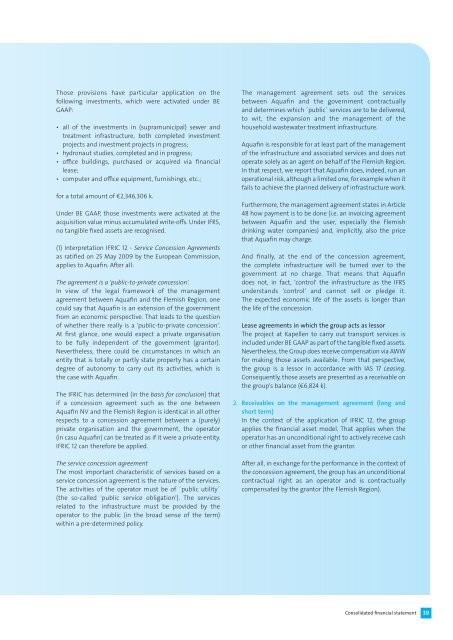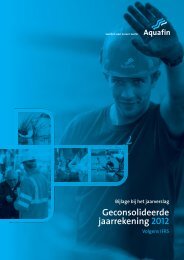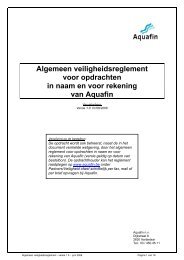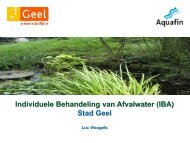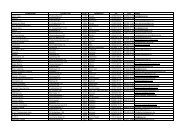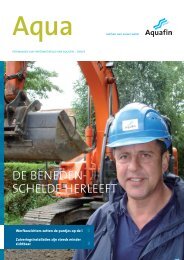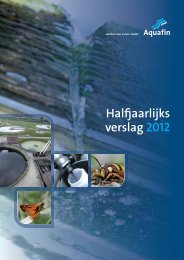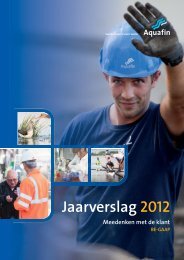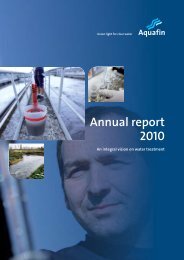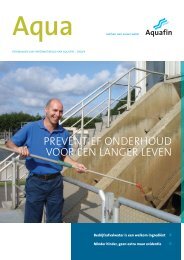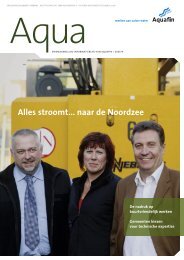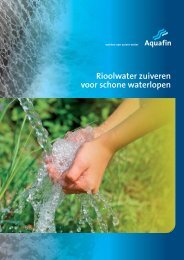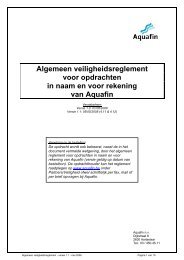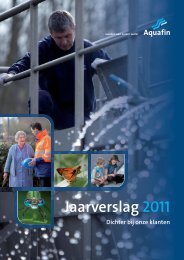Consolidated financial statement 2011 - Aquafin
Consolidated financial statement 2011 - Aquafin
Consolidated financial statement 2011 - Aquafin
You also want an ePaper? Increase the reach of your titles
YUMPU automatically turns print PDFs into web optimized ePapers that Google loves.
Those provisions have particular application on the<br />
following investments, which were activated under BE<br />
GAAP:<br />
• all of the investments in (supramunicipal) sewer and<br />
treatment infrastructure, both completed investment<br />
projects and investment projects in progress;<br />
• hydronaut studies, completed and in progress;<br />
• office buildings, purchased or acquired via <strong>financial</strong><br />
lease;<br />
• computer and office equipment, furnishings, etc.;<br />
for a total amount of €2,346,306 k.<br />
Under BE GAAP, those investments were activated at the<br />
acquisition value minus accumulated write-offs. Under IFRS,<br />
no tangible fixed assets are recognised.<br />
(1) Interpretation IFRIC 12 - Service Concession Agreements<br />
as ratified on 25 May 2009 by the European Commission,<br />
applies to <strong>Aquafin</strong>. After all:<br />
The agreement is a 'public-to-private concession'.<br />
In view of the legal framework of the management<br />
agreement between <strong>Aquafin</strong> and the Flemish Region, one<br />
could say that <strong>Aquafin</strong> is an extension of the government<br />
from an economic perspective. That leads to the question<br />
of whether there really is a 'public-to-private concession'.<br />
At first glance, one would expect a private organisation<br />
to be fully independent of the government (grantor).<br />
Nevertheless, there could be circumstances in which an<br />
entity that is totally or partly state property has a certain<br />
degree of autonomy to carry out its activities, which is<br />
the case with <strong>Aquafin</strong>.<br />
The IFRIC has determined (in the basis for conclusion) that<br />
if a concession agreement such as the one between<br />
<strong>Aquafin</strong> NV and the Flemish Region is identical in all other<br />
respects to a concession agreement between a (purely)<br />
private organisation and the government, the operator<br />
(in casu <strong>Aquafin</strong>) can be treated as if it were a private entity.<br />
IFRIC 12 can therefore be applied.<br />
The service concession agreement<br />
The most important characteristic of services based on a<br />
service concession agreement is the nature of the services.<br />
The activities of the operator must be of ´public utility´<br />
(the so-called 'public service obligation'). The services<br />
related to the infrastructure must be provided by the<br />
operator to the public (in the broad sense of the term)<br />
within a pre-determined policy.<br />
The management agreement sets out the services<br />
between <strong>Aquafin</strong> and the government contractually<br />
and determines which ´public´ services are to be delivered,<br />
to wit, the expansion and the management of the<br />
household wastewater treatment infrastructure.<br />
<strong>Aquafin</strong> is responsible for at least part of the management<br />
of the infrastructure and associated services and does not<br />
operate solely as an agent on behalf of the Flemish Region.<br />
In that respect, we report that <strong>Aquafin</strong> does, indeed, run an<br />
operational risk, although a limited one, for example when it<br />
fails to achieve the planned delivery of infrastructure work.<br />
Furthermore, the management agreement states in Article<br />
48 how payment is to be done (i.e. an invoicing agreement<br />
between <strong>Aquafin</strong> and the user, especially the Flemish<br />
drinking water companies) and, implicitly, also the price<br />
that <strong>Aquafin</strong> may charge.<br />
And finally, at the end of the concession agreement,<br />
the complete infrastructure will be turned over to the<br />
government at no charge. That means that <strong>Aquafin</strong><br />
does not, in fact, 'control' the infrastructure as the IFRS<br />
understands 'control' and cannot sell or pledge it.<br />
The expected economic life of the assets is longer than<br />
the life of the concession.<br />
Lease agreements in which the group acts as lessor<br />
The project at Kapellen to carry out transport services is<br />
included under BE GAAP as part of the tangible fixed assets.<br />
Nevertheless, the Group does receive compensation via AWW<br />
for making those assets available. From that perspective,<br />
the group is a lessor in accordance with IAS 17 Leasing.<br />
Consequently, those assets are presented as a receivable on<br />
the group's balance (€6,824 k).<br />
2. Receivables on the management agreement (long and<br />
short term)<br />
In the context of the application of IFRIC 12, the group<br />
applies the <strong>financial</strong> asset model. That applies when the<br />
operator has an unconditional right to actively receive cash<br />
or other <strong>financial</strong> asset from the grantor.<br />
After all, in exchange for the performance in the context of<br />
the concession agreement, the group has an unconditional<br />
contractual right as an operator and is contractually<br />
compensated by the grantor (the Flemish Region).<br />
<strong>Consolidated</strong> <strong>financial</strong> <strong>statement</strong><br />
39


